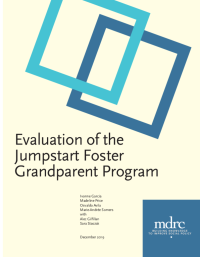Evaluation of the Jumpstart Foster Grandparent Program

 Children’s school readiness as they enter kindergarten is an important predictor of their academic success and ultimately their long-term health and economic outcomes. Research shows that participation in high-quality early childhood education helps preschoolers gain the foundational language and literacy skills as well as the social-emotional competencies they need to be ready for kindergarten. Even so, free or affordable high-quality preschool options remain limited for families in many underserved communities, and children growing up in poverty often have less access to the kinds of early learning opportunities that contribute to school readiness.
Children’s school readiness as they enter kindergarten is an important predictor of their academic success and ultimately their long-term health and economic outcomes. Research shows that participation in high-quality early childhood education helps preschoolers gain the foundational language and literacy skills as well as the social-emotional competencies they need to be ready for kindergarten. Even so, free or affordable high-quality preschool options remain limited for families in many underserved communities, and children growing up in poverty often have less access to the kinds of early learning opportunities that contribute to school readiness.
Jumpstart is a nonprofit organization that aims to address the school readiness gap. It partners with early childhood education centers across the country to increase their capacity to provide high-quality language and literacy instruction to children in underserved communities. Jumpstart’s program model, delivered by volunteers, includes weekly curriculum-based sessions focused on children’s language and literacy development, as well as increased opportunities for volunteers to interact with children one-on-one and contribute to their language and social-emotional development in a less-structured format called child-centered time (CCT).
With support from the Corporation for National and Community Service (CNCS), MDRC evaluated Jumpstart’s Foster Grandparent Program (JFG) in Los Angeles and Compton, California, where Jumpstart’s services were delivered by older adults from the community (Community Corps members or “Foster Grandparents”). The evaluation examines whether the JFG program, which operated from fall 2011 to summer 2019, was implemented as intended and in what ways the volunteers enhanced children’s educational and developmental experience in the classroom. Using a child-level, random assignment research design, this evaluation also explores whether the JFG program model shows promise for improving children’s language and literacy and social-emotional development.
Key Findings
This evaluation found that:
- The Foster Grandparents had consistently high attendance at training sessions and reported feeling adequately prepared to provide services to children.
- The Foster Grandparents demonstrated a strong commitment to the program, and children experienced an increased number of adults in the classroom.
- The Foster Grandparents implemented the curriculum-based sessions regularly and as intended. While implementing the sessions, volunteers used various instructional practices aimed at improving children’s language and literacy development, but the frequency with which these practices were used in the classroom varied across centers.
- The Foster Grandparents devoted a high number of hours to CCT. However, it is not possible to determine how much of that time was spent one-on-one with partner children versus providing general classroom support.
- Children who received services from volunteers made gains in language and literacy development, but the gains were not greater than those made by children who did not receive services from volunteers.
Read how Jumpstart is applying the findings from the MDRC study to improve its programming.






